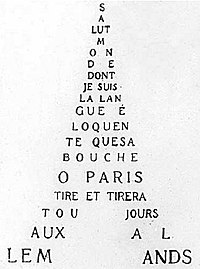Guillaume Apollinaire
Guillaume Apollinaire (French pronunciation: /ɡijom apɔlinɛʁ/, –de full name Wilhelm Albert Włodzimierz Apolinary de Kostrowicki–, Rome, August 26, 1880-Paris, November 9, 1918) or simply known in Spanish as Guillermo Apollinaire, was an Italian-born naturalized French poet, playwright, theorist, and art critic of Belarusian-Polish descent; he was the creator of the calligram and gave its name to "surrealism".
In 1914, he volunteered for the French army after the outbreak of World War I. He was seriously wounded in the temple in 1916, the same year in which he was granted French nationality. Two years later he married Jacqueline Kolb, but he died that same year, a victim of the 1918 flu pandemic, while he was still convalescing, being buried in the Père-Lachaise cemetery. He was declared Mort pour la France (Killed for France) in honor of his service during the war.
His pseudonym is nothing more than the Francophonization of his first name: Wilhelm to Guillaume (which literally translates as Guillermo in German and French) and the Frenchification of his last name, from Apolinary to Apollinaire.
Biography
He was born in Rome on August 26, 1880, to a Polish mother. She had a brother named Esteban. Her father abandoned them very soon. He and his brother grew up in Monaco, where he studied at the Lycée Sant-Charles. Likewise, they spent some years of his youth in the French town of Nice.
He worked at various jobs: in 1901 he went to Germany for a year to survive as tutor to the daughter of the Viscountess of Milhau. Upon his return to Paris in 1902, he worked as an accountant on the stock market and as a critic for various magazines, from which he theorized in defense of the new tendencies in art and frequented artistic and literary circles in the French capital, where he acquired a certain notoriety..
In 1909 he published his first book, The enchanter in putrefaction, based on the legend of Merlin and Viviane, which was followed by a series of fabulous stories. His books of poems Bestiario o El cortejo de Orfeo (1911) and Alcoholes (1913) reflect the influence of symbolism, while already introducing important formal innovations; That year the critical essay Les peintres cubistes (The Cubist Painters) appeared, a fiery defense of the new movement as an overcoming of realism.
On September 7, 1911, the poet was arrested accused of being related to the theft of La Gioconda at the Louvre Museum (perpetrated on August 21 of that year by Vincenzo Peruggia). The accusation was due to his links with Gery Piéret, guilty of having previously stolen two statuettes from the Louvre Museum. In turn, Apollinaire implicated Pablo Picasso, but both were eventually released.
At the outbreak of World War I in 1914, he enlisted as a volunteer and was seriously wounded in the head in 1916, at which time he was granted French nationality. He died two years later in Paris, a victim of the 1918 flu pandemic, while he was still convalescing, being buried in the Père-Lachaise cemetery.
Calligrams
In 1913 he published his first collection Alcoholes, in which he chose to integrate several poems written over several years and managed to place an anagram in some poems.
In the poems of Caligrams, subtitled Poemas de la paz y de la guerra, he took the formal experimentation of his previous works to the extreme, preluding surrealist automatic writing to the deliberately breaking the logical and syntactic structure of the poem.
Collection of poems inspired by the war and written in the trenches. They are very varied:
- With or without typography and color intervention
- Marked Scripture
- drawn with the word
- built with deformed letters
- Empty
- Concrete
- Anti-representative and self-representative
Famous, on the other hand, are his «ideogramas», in which typography was used to «draw» objects with the text of the poem itself, in an attempt to approach cubism and as an expression of the avant-garde desire to break the distinctions of genres and arts. This technique today is called "visual poetry", as a whole or a base from which this taxonomy of different expressions such as calligrammatics is made; Referring to poetry, there is also auditory poetry, poetry sound.
They were used to represent cubism (the first avant-garde) in a literary way.
Apollinaire and Surrealism
Apollinaire was the first to use the terms surrealism and surrealist. He invented the term in March 1917 in a letter sent to the Belgian poet Paul Dermée, and used it again in June 1917, on the occasion of the premiere of his play Les tetas de Tiresias, at the which he described as "surrealist drama", to express a way of seeing reality, because no other served him. He defined it as follows: «When man wanted to imitate walking, he created the wheel, which does not look like a leg at all. He thus he made surrealism without knowing it ». Breton in his Manifesto of 1924, recovered the word, although giving it another meaning.
Works
Poems
- The beast or the courtship of Orpheus (1911)
- Alcohol (1913)
- Caligrams (1918)
- Vitam impendere amori
- Il y a
- Poèmes à Lou
- Poèmes a la Marraine
- Poèmes retrouvés
- Before the cinema
Drama
- Tiresian tits (surrealistic drama)
- Time color
- Casanova
- The Mariner of Amsterdam
Works in prose
- The murdered poet
- The charming rotten
- The Heresiarca and Cia
- Eleven thousand vergas
- The femme assise
- The End of Babylone
- Les Trois Don Juan
Calligrams
- The dove stabbed and the assortment
Contenido relacionado
Euripides
Song (lyrical)
Philip of Bourbon
